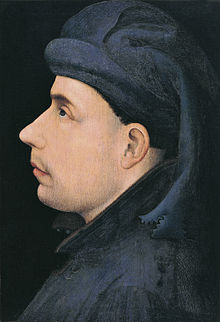Wenceslaus I of Luxembourg
| Wenceslaus I | |
|---|---|

Wenceslaus I of Luxembourg
|
|
| Count of Luxembourg, Arlon and Durbuy | |
| Reign | 1353-13 March 1354 |
| Predecessor | Emperor Charles IV |
| Duke of Luxembourg | |
| Reign | 13 March 1354-7 December 1383 |
| Successor | Wenceslaus IV |
| Duke of Brabant and Limburg | |
| Reign | 1355-1383 with Joanna |
| Predecessor | John III |
| Successor | Joanna |
| Born |
25 February 1337 Prague |
| Died | 7 December 1383 (aged 46) Luxembourg |
| Burial | Abbaye d'Orval, Belgium |
| Spouse | Joanna, Duchess of Brabant |
| House | Luxembourg |
| Father | John of Bohemia |
| Mother | Beatrice of Bourbon |
Wenceslaus I (also Wenceslas, Venceslas, Wenzel, or Václav, often called Wenceslaus of Bohemia in chronicles) (Prague, 25 February 1337 – Luxembourg, 7 December 1383) was the first Duke of Luxembourg from 1354. He was the son of John the Blind, King of Bohemia, and Beatrice of Bourbon.
Beatrice of Bourbon, gave birth to her only child, Duke Wenceslaus I, on Feb. 25, 1337. He was born by way of Caesarian section. According to Dr. Antonin Parizek of Charles University in Prague, Beatrice is perhaps the earliest known case of a woman surviving a Caesarian section birth. In 1353 Charles IV King of Bohemia, Count of Luxembourg and elected Holy Roman King, entrusted the county, their father's inheritance, to his half-brother Wenceslaus. In 1352, Wenceslaus married Joanna (1322 – 1406), daughter of John III, Duke of Brabant and Limburg, and Marie d'Évreux. In 1354 Charles raised Luxembourg to the status of a duchy. In 1355, Joanna inherited Brabant and Limburg. In order to guarantee the indivisibility of Brabant, Wenceslaus signed the Joyous Entry, but had to fight against his brother-in-law Louis II of Flanders, who asserted his share of the duchy. He failed to prevent the seizure of Brussels by the Flemings, but a certain Everard 't Serclaes succeeded by an audacious coup in driving them out of the city. Thereafter, Wenceslaus had to face primarily internal disorders. In 1371, he overestimated his military capacities and waged war with William II, Duke of Jülich, resulting in humiliating defeat at the Baesweiler, losing a part of his army, and several noblemen. He was captured and suffered 11 months of captivity.
...
Wikipedia
